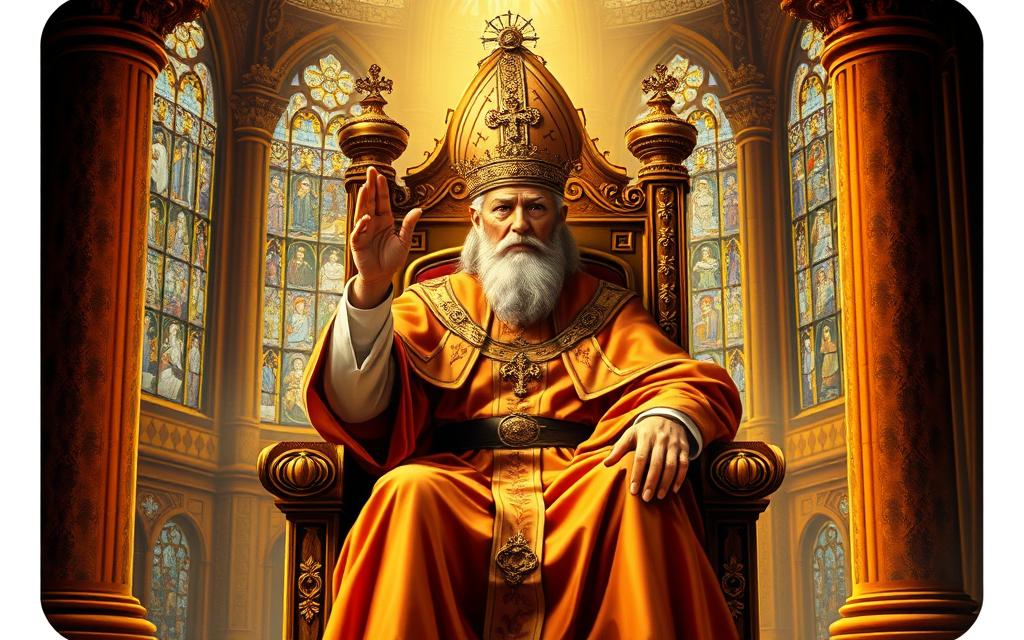Understanding the Hierophant Tarot card is crucial for gaining insight into spiritual guidance and tradition. In tarot readings, this card often represents conformity and spiritual guidance.
When seeking yes or no answers from tarot readings, the Hierophant card can provide valuable insight. It is associated with spiritual tradition and conformity, suggesting that the answer lies within established norms and values.
The Hierophant’s presence in a reading can indicate a need to follow traditional paths or seek guidance from established authorities, influencing the interpretation of yes or no questions.
Table of Contents
Understanding the Hierophant Tarot Card
Understanding the Hierophant Tarot card requires delving into its rich hierophant symbolism and historical context. The Hierophant, also known as the High Priest, is a card that represents spiritual guidance, tradition, and conformity.
The Hierophant is the fifth card in the Major Arcana of the Tarot deck and is associated with the number 5, symbolizing a bridge between the material and spiritual worlds.
Symbolism and Imagery of the Hierophant
The Hierophant is depicted as a religious figure, often with a papal tiara and ornate robes, signifying spiritual authority and tradition. The card’s imagery includes two acolytes, representing the transmission of spiritual knowledge and the importance of tradition and conformity.
The Hierophant’s symbolism is deeply rooted in its historical context, drawing from Catholic and Christian traditions. The card’s depiction of a religious figure emphasizes the importance of spiritual guidance and the role of religious institutions in providing a framework for spiritual growth.
Traditional Meanings and Associations
Traditionally, the Hierophant is associated with spiritual guidance, tradition, and conformity. It represents the need for spiritual mentorship and the importance of following established traditions and practices.
| Aspect | Traditional Meaning | Association |
|---|---|---|
| Spiritual Guidance | Need for mentorship | Spiritual teachers or guides |
| Tradition | Conformity to established practices | Religious or cultural traditions |
| Conformity | Following the rules and norms | Social and religious expectations |
The Hierophant’s traditional meanings and associations provide a foundation for understanding its role in Tarot interpretation, particularly in yes or no questions.
The Hierophant Tarot: Yes or No Meaning
When seeking clarity in tarot readings, understanding the Hierophant’s yes or no meaning is crucial. The Hierophant, a symbol of tradition and conformity, can offer significant insights into various aspects of life.
General Yes or No Interpretation
The Hierophant tarot card is generally considered to indicate a “yes” in yes or no readings, particularly when the question pertains to following established norms or traditions. This card suggests that the querent is on a path that is in alignment with conventional expectations.
For instance, if the question is about proceeding with a traditional wedding or following a well-established career path, the Hierophant’s presence is likely to be interpreted as a positive affirmation.
“The Hierophant represents the spiritual guidance that is available to us all, and his presence in a reading can signify a need to seek out traditional or established sources of wisdom.”
Factors That Influence the Answer
Several factors can influence the Hierophant’s yes or no meaning in a tarot reading. The card’s position in the spread, the question being asked, and the surrounding cards can all impact the interpretation.
For example, if the Hierophant appears in a reading related to a highly unconventional decision, its traditional “yes” might be nuanced by the context of the question and the other cards drawn.
| Factor | Influence on Hierophant’s Meaning |
|---|---|
| Card Position | The Hierophant’s position can indicate the area of life where tradition is relevant. |
| Question Context | The nature of the question can sway the Hierophant’s interpretation towards yes or no. |
| Surrounding Cards | Cards drawn alongside the Hierophant can modify or reinforce its traditional meaning. |
For more insights into tarot cards that can provide precise yes or no answers, you can explore 7 Tarot Cards for Precise Yes or No.
Upright Hierophant in Yes or No Questions
When the Hierophant appears upright in a yes or no tarot reading, it often signifies a positive response. This card is associated with tradition, conformity, and spiritual guidance, suggesting that the answer to your question is likely in alignment with established norms or values.
When the Hierophant Indicates “Yes”
The upright Hierophant can indicate a “yes” answer in situations where you’re seeking guidance on following traditional paths or conforming to certain expectations. For instance, if you’re considering a conventional career path or a decision that aligns with societal norms, the Hierophant’s presence suggests a positive outcome. It advises you to respect the tried and tested methods, indicating that your question is likely to be met with a favorable response.
For example, if you’re asking about the prospects of a long-term relationship or a commitment, the upright Hierophant can signify a “yes,” indicating stability and conformity to traditional relationship values. It’s a card that supports following established protocols and respecting the wisdom of those who have come before you.
Situations Where the Answer May Be Conditional
While the upright Hierophant often leans towards a positive response, there are situations where the answer may be conditional. This card can suggest that your question’s outcome depends on your adherence to certain traditional values or expectations. For instance, if you’re asking about success in a field that requires innovation and deviation from the norm, the Hierophant might indicate a need to conform or adjust your approach to fit within established boundaries.
It’s also worth noting that the Hierophant’s message can be influenced by the context of the question and the other cards in the tarot spread. For a deeper understanding of how different tarot cards interact in a reading, you can explore our guide on the Justice Tarot card in yes or no, which provides insights into another significant tarot card and its implications in various contexts.
Reversed Hierophant in Yes or No Questions
The reversed Hierophant tarot card is a complex symbol that can indicate a “no” or a need for reevaluation in yes or no questions. When interpreting the reversed Hierophant, it’s essential to consider the context of the question and the reading.
When the Reversed Hierophant Indicates “No”
The reversed Hierophant can signify a “no” in situations where tradition, conformity, or established structures are being questioned. For instance, if you’re asking about following a conventional path in your career or relationship, the reversed Hierophant might suggest that this isn’t the right approach for you. It can indicate rebellion, nonconformity, or a need to break free from restrictive traditions. For more insights on the Hierophant’s role in yes or no tarot readings, you can visit Aunty Flo’s Tarot Spread for a deeper understanding.
Nuances and Exceptions to Consider
While the reversed Hierophant can indicate a “no,” there are nuances to consider. The card can also suggest that the querent is on the verge of a significant personal or spiritual change, where the traditional “yes” or “no” might not apply directly. It’s crucial to consider the question’s context and the other cards in the tarot spread. For example, if the question is about spiritual guidance, the reversed Hierophant might encourage you to look beyond traditional spiritual structures. You can explore more about tarot interpretations and their terms on True You Tarot.
| Reversed Hierophant Interpretation | Context | Possible Outcome |
|---|---|---|
| Indicates “No” | Conventional paths or traditions | Rebellion or nonconformity |
| Need for Reevaluation | Personal or spiritual change | New perspectives or approaches |
| Exception or Nuance | Spiritual guidance or questioning | Looking beyond traditional structures |
Understanding the reversed Hierophant in yes or no tarot questions requires a nuanced approach, considering both the card’s symbolism and the context of the reading. By doing so, you can gain a deeper insight into the tarot’s message and its relevance to your question.
The Hierophant in Different Question Contexts
The Hierophant Tarot card’s interpretation varies significantly across different question contexts. Its meaning can shift based on the area of life being queried, whether it’s love, career, spiritual growth, or health.
Love and Relationship Questions
In the context of love and relationships, the Hierophant often suggests traditional values and conformity. It can indicate a stable, long-term relationship or the importance of following societal norms in one’s romantic life.
For instance, if asking about the potential for a long-term commitment, the Hierophant can be a positive sign, indicating a strong foundation based on shared values and mutual respect.
Career and Financial Questions
When it comes to career and financial inquiries, the Hierophant can signify the importance of structure, tradition, and established protocols. It may suggest that following conventional career paths or financial planning strategies is advisable.
A table summarizing the Hierophant’s implications in career and financial contexts is as follows:
| Context | Hierophant’s Interpretation |
|---|---|
| Career Advancement | Following traditional career paths, respecting hierarchy |
| Financial Decisions | Conservative financial planning, avoiding risk |
Spiritual and Personal Growth Questions
In matters of spiritual and personal growth, the Hierophant suggests a need for spiritual guidance and adherence to traditional spiritual practices. It can indicate a period of spiritual conformity or the importance of seeking wisdom from established spiritual authorities.
Health and Wellbeing Questions
For health and wellbeing questions, the Hierophant may advise sticking to conventional health practices and seeking advice from healthcare professionals. It can indicate the importance of routine and stability in maintaining good health.
Conclusion
The Hierophant Tarot card is a complex symbol with deep meanings in yes or no readings. Throughout this article, we’ve explored its symbolism, traditional meanings, and how it influences answers to yes or no questions. Understanding the Hierophant Tarot yes or no interpretations can provide valuable insights into various aspects of life, from love and relationships to career and personal growth.
In yes or no readings, the Hierophant Tarot can indicate a “yes” when it suggests conformity to traditional values or when the question pertains to spiritual or moral guidance. For more nuanced questions, the card’s meaning can shift, suggesting a need to consider the context and other influencing factors. If you’re seeking a deeper understanding of the Hierophant Tarot or have specific questions, consider exploring further or reaching out to a tarot expert for personalized guidance.
By grasping the Hierophant Tarot’s significance in yes or no readings, individuals can enhance their tarot reading skills and gain a deeper understanding of the card’s role in providing guidance and insight.


